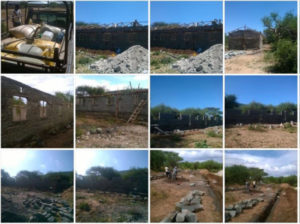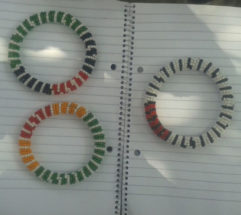Female genital mutilation (FGM), also known as female genital cutting (FGC) and female circumcision, is the ritual cutting or removal of some or all of the external female genitalia. The phenomena is part of traditional initialization rites. Girls concerned face serious and irreversible risks to their health and psychological problems as a consequence of the traumatic experience of this ritual. FGM has to be put into the cultural context to fight it and therefore, it is essential that the entire community undergoes a process of change in the way they view FGM.
Traditionally, Maasai girls had to undergo FGM at the age of about 15 years old, shortly before their arranged weddings – regardless of the already existing ban by Kenyan law.
Project
The project was born as a result of an initiative of the women of the community and the council of elders who oppose the violent ritual of FGM and consider it to be archaic and health damaging.
The aim was to build a multi purpose centre in the Kajiado District to provide local Maasai women with a safe place where they can turn to with questions concerning topics such as sex, pregnancy and birth giving.
Functions of the MMAC
- Dispensary where women are accompanied by a medical doctor during their pregnancy and labour. Moreover, here they receive sex education about sexually transmitted diseases (STD) and birth control as well as psychological support. The dispensary was officially recognized by the Kenyan government in August 2016 after the digging of a waste disposal for afterbirths under the dispensary.
- Launch of a Women’s Cooperative for the production of traditional Maasai jewelry. The women are organized autonomously and have the potential to provide themselves with a source of income by selling the jewelry at the market in Kajiado. The production of the Smile.28 bracelet, which can be used for natural birth control, was encouraged. This women’s cooperative has also been officially recognized by the Kenyan government.
- Training centre for lobbying against FGM. Education and training of local opinion leaders to assist them in their fight against FGM. In particular, activities provided strive to make people realize how violent this archaic ritual is and to show them alternatives for the society. It is important to raise awareness within the community and especially among men and teenagers.
The project planning was done by La Nostra Africa and construction works was locally monitored and coordinated by Kagiri Duncan.


The construction works began on December 1st, 2014 and on February 25th, 2015 the MMAC was finished. After termination of the construction, District Chief Shadrack Mututua was handed over the management of the different activities. The costs were 80,000 Euro and the centre was entirely financed by the proceeds from the Bazaar.



